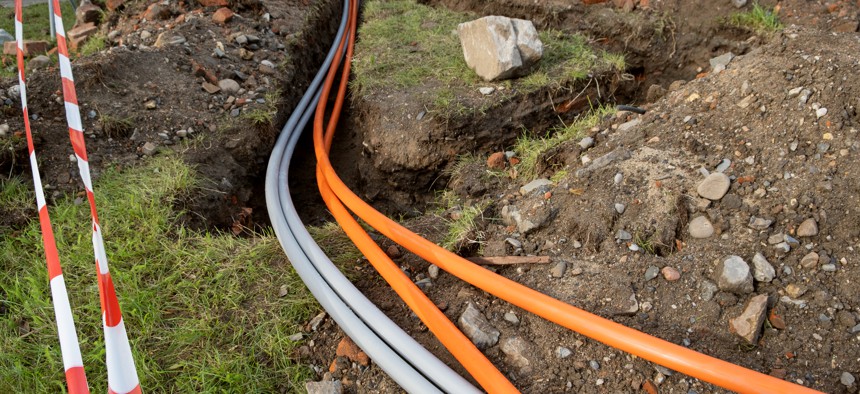More cities offer broadband service, study says

Roman Mykhalchuk via Getty Images
The pandemic and federal funding has spurred the growth of municipally owned internet in the past two years as cities look to offer cheaper service.
More cities are increasingly offering their own broadband service, partly because of federal funding and because city officials saw during the pandemic the need to offer their citizens better and more affordable service.
At least 42 local governments started their own service in the last two years, according to a recent study by the Institute for Local Self-Reliance, which advocates for municipally owned broadband.
“2022 and 2023 were the most active years that we have seen since we started keeping track [in 2008],” said Ry Marcattilio, associate director for research for the association’s Community Broadband Networks Initiative.
By comparison, only five municipalities launched services in 2021, nine in 2020, 19 in 2019 and eight in 2018.
The approaches vary, according to the study. Some cities are building fiber and allowing companies to sell it as a service at low prices. Others, like Waterloo, Iowa, are treating it like a utility, similar to water or electricity.
Waterloo began beta testing its broadband service over the holidays with four customers, and plans to roll it out to all 30,000 households in the spring. It will offer faster, 1 gigabits per second service for $69.95 a month, which is about $30 cheaper than the lowest price in the area, according to Eric Lage, general manager of telecommunications for Waterloo Fiber. It will also offer slower, 100 megabits per second service for $29.96. Depending on if the Affordable Connectivity Program is extended by Congress—it is set to run out of funding in April—the service would be free for low-income people.
“A big part of this is to make the internet accessible to every address in Waterloo,” Lage said, particularly those with low incomes.
After the pandemic in 2022, 84% of the city’s voters approved using $20 million in municipal bonds for the project. The widespread support “was a pretty, good sign that the citizens wanted the project to move forward,” Lage said. The pandemic “exposed the need” for faster and cheaper broadband service, he continued. “People want a different choice.”
It hasn’t helped that Waterloo residents have for years been watching their neighbors in nearby Cedar Falls enjoy affordable internet through its municipal broadband service, according to Lage. Unlike several states, Iowa does not have laws restricting or barring municipalities from offering their own broadband service.
Waterloo will be paying for the project with $30 million in federal American Rescue Plan Act and Economic Development Administration funding. It will pay the additional $60 million for the project through revenue bonds.
Given the increased interest in the last two years, Marcattilio said he expects more cities to begin offering their own broadband service, as a cheaper option to those offered by private companies.
“We're seeing more and more cities starting to explore it, and starting to do feasibility studies,” he said. “It feels at least like we are right at the beginning of a slow rise in cities that are going to start doing this. There's going to be bigger and bigger waves coming down the pipeline.”
The report also cited four New York municipalities—Sherburne, Nichols, Diana and Pitcairn—that are using $10 million from a state grant program to build broadband service.
Sherburne officials declined to talk about its project. But according to the report, the village’s electric utility worked with the New York Power Authority to expand a state middle-mile fiber network to bring fiber to Sherburne’s 1,800 homes and businesses.
Now the village’s electric utility is working with two internet service providers to offer broadband to residents, according to the Sherburne Fiber website. Monthly internet service at 1,000 Mbps will cost $59.95, $30 of which will go to the utility.
“Reliable internet is critical infrastructure—no different than electricity, water, sewer or roads,” Sherburne’s mayor said in a statement. “This is our answer. Creating a village owned fiber optic network.”
Kery Murakami is a senior reporter for Route Fifty, covering Congress and federal policy. He can be reached at kmurakami@govexec.com. Follow @Kery_Murakami
NEXT STORY: Chicago could be first major Midwestern city to ban gas in new construction






